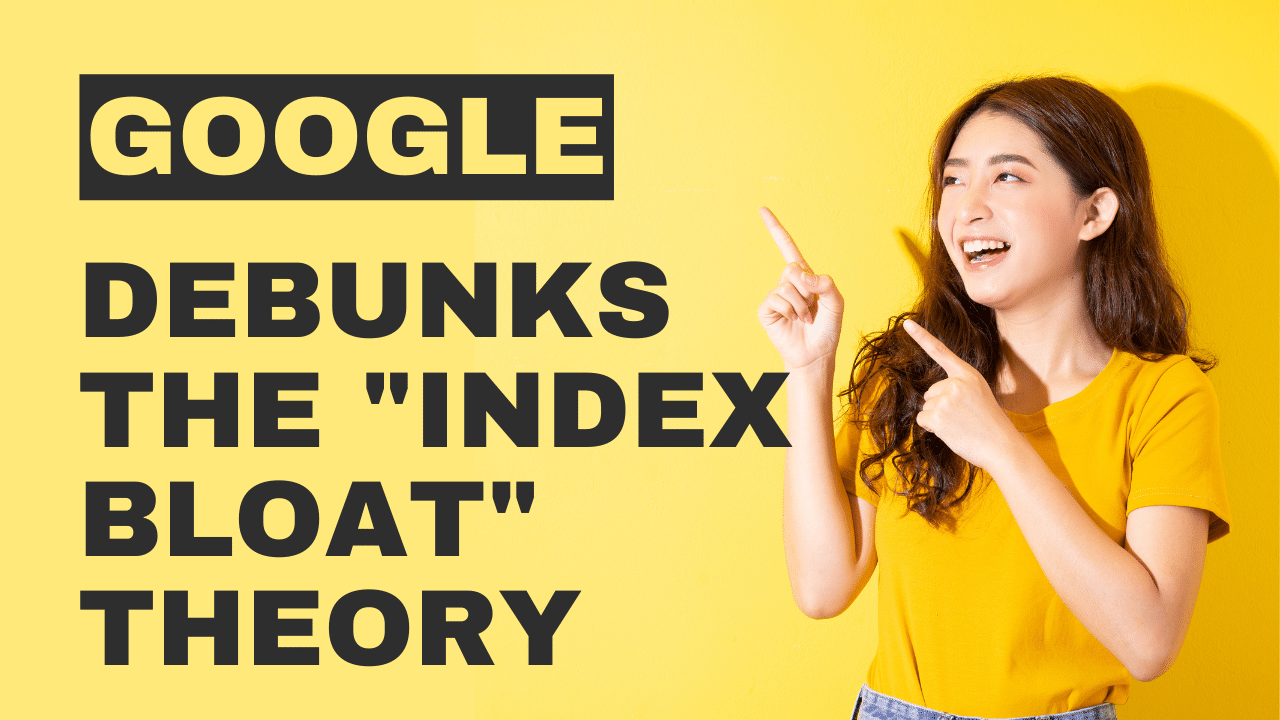SEO
Google Debunks The “Index Bloat” Theory
| Outline of the Article |
|---|
| 1. Introduction |
| 2. What is “Index Bloat”? |
| 2.1 Definition |
| 2.2 Causes |
| 3. Debunking the Theory |
| 3.1 Google’s Statement |
| 3.2 Explanation |
| 4. Importance of Index Size |
| 5. Myth or Misunderstanding? |
| 6. The Role of SEO |
| 7. Tips to Optimize Indexing |
| 7.1 Content Quality |
| 7.2 Site Architecture |
| 7.3 XML Sitemaps |
| 7.4 Robots.txt |
| 8. Conclusion |
| 9. FAQs |
Google Debunks The “Index Bloat” Theory
Introduction
In the world of SEO, various theories and misconceptions often circulate, influencing website owners and marketers in their optimization strategies. One such theory that has gained attention recently is “index bloat.” This article aims to explore the concept of index bloat, debunk the theory, and provide insights into the importance of index size and effective SEO practices.
What is “Index Bloat”?
Definition
Index bloat refers to the notion that having a large number of pages indexed by search engines negatively impacts a website’s performance and search visibility. According to this theory, search engines may penalize or devalue websites that have an excessive number of indexed pages.
Causes
Index bloat can be caused by various factors, including duplicate content, thin or low-quality pages, excessive tag pages, and inefficient site architecture. These factors allegedly contribute to an inflated index, leading to reduced search rankings and visibility.
Debunking the Theory
Google’s Statement
Google has recently debunked the index bloat theory, clarifying that the number of indexed pages does not inherently impact a website’s search rankings. In an official statement, Google emphasized that they do not have a specific limit on the number of indexed pages for a website.
Explanation
Google’s search algorithm focuses on delivering the most relevant and useful results to users. Instead of penalizing websites based on index size, Google prioritizes factors like content quality, relevance, and user experience. The number of indexed pages alone does not determine a website’s search visibility or rankings.
Importance of Index Size
While index size itself may not directly affect search rankings, it still plays a crucial role in organic visibility. A larger index allows search engines to discover and crawl a broader range of content on a website. This, in turn, increases the likelihood of more pages being displayed in search results, potentially attracting additional organic traffic.
Myth or Misunderstanding?
The notion of index bloat may stem from a misunderstanding of search engine algorithms and the complexities of SEO. It is essential to differentiate between index bloat and legitimate indexing issues that can impact a website’s performance. Understanding the intricacies of search engine indexing can help dispel misconceptions and focus on effective optimization strategies.
The Role of SEO
SEO professionals play a vital role in optimizing websites for search engines. Instead of fixating on index bloat, SEO efforts should primarily focus on improving content quality, relevance, and user experience. By aligning with search engine guidelines and best practices, websites can enhance their search visibility and organic traffic.
Tips to Optimize Indexing
To ensure efficient indexing and maximize search visibility, website owners and SEO practitioners can follow these tips:
Content Quality
Creating high-quality, unique, and valuable content is essential. Focus on relevance to target audience, thorough research, and comprehensive coverage of topics.
Site Architecture
Develop a well-structured site architecture that facilitates easy navigation for both users and search engines. Implement proper categorization, internal linking, and a clear hierarchy of pages.
XML Sitemaps
Generate and submit XML sitemaps to search engines to assist in discovering and indexing content efficiently. Keep the sitemap updated and free from errors.
Robots.txt
Utilize the robots.txt file to guide search engine crawlers and prevent indexing of irrelevant or sensitive pages. Use it judiciously to ensure search engines prioritize indexing of essential content.
Conclusion
In conclusion, the “index bloat” theory has been debunked by Google. The number of indexed pages alone does not directly impact a website’s search rankings. While index size is important for organic visibility, focusing on content quality, relevance, and user experience remains paramount. SEO efforts should align with search engine guidelines and best practices to achieve optimal results.
FAQs
Q1: Is a larger index always better for SEO?
A1: While a larger index can potentially increase organic visibility, the quality and relevance of the indexed pages are crucial. Focus on creating high-quality content rather than solely increasing the number of indexed pages.
Q2: Can index bloat negatively affect website performance?
A2: Index bloat itself does not directly impact website performance. However, other issues related to poor content quality or site architecture can affect performance and search rankings.
Q3: Should I remove low-quality or thin pages from the index?
A3: Removing low-quality or thin pages can be beneficial for SEO. However, it is crucial to evaluate the content and determine if improvement or removal is the best approach.
Q4: Are there any limits on the number of indexed pages?
A4: Google does not have a specific limit on the number of indexed pages for a website. They focus on relevance, content quality, and user experience instead of the index size.
Q5: How can I optimize my website’s index for better search visibility?
A5: To optimize your website’s index, focus on content quality, improve site architecture, utilize XML sitemaps, and guide search engines with a well-structured robots.txt file.

